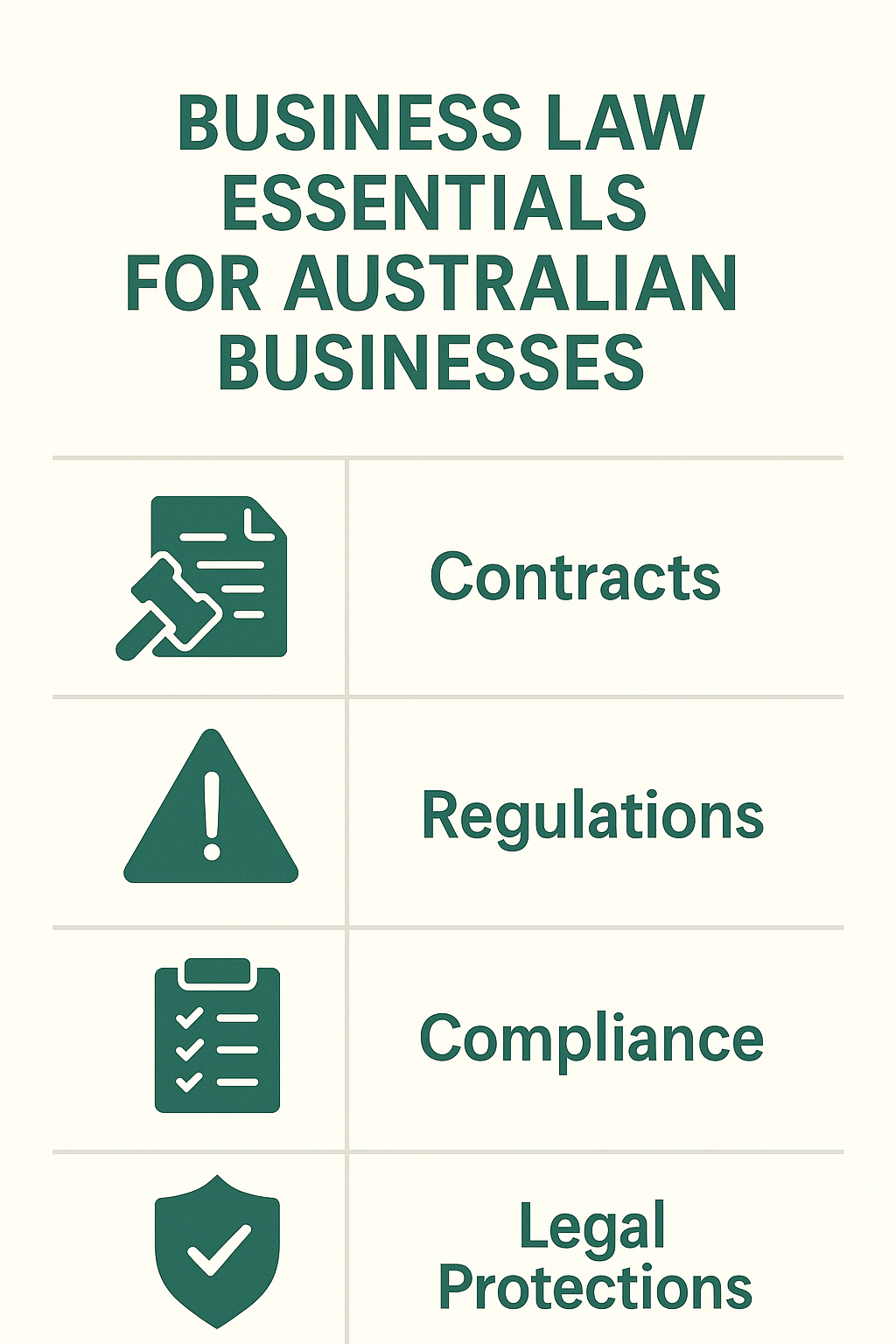Navigating Australia’s intricate business law landscape is essential for entrepreneurs and business professionals aiming to thrive in a competitive market.
Understanding business legal requirements, from compliance with business regulations to mastering commercial law, can empower business owners to make informed decisions that foster growth and innovation.
As the backbone of corporate governance, business law serves as a guide and a trusted ally in ensuring that enterprises operate smoothly and ethically.
In this guide, we delve into the critical aspects of business law in Australia, offering practical insights and actionable strategies that equip you to steer your business towards success confidently.
Join us as we explore how embracing these legal frameworks safeguards your venture and unlocks new opportunities for expansion and sustainability.
Understanding Business Law in Australia
Business law in Australia forms the foundation for all commercial activities.
It encompasses a wide range of legal areas impacting how businesses operate, from formation to day-to-day operations.
Key Legal Requirements for Businesses
Starting a business in Australia requires adherence to specific legal requirements.
These include registering your business name, obtaining necessary licenses, and understanding tax obligations.
To begin, you must choose a suitable business structure. This decision impacts your tax liabilities, personal liability, and reporting requirements. Typical structures include sole trader, partnership, company, and trust.
Next, register your business name with the Australian Securities and Investments Commission (ASIC). This step is crucial for establishing your brand identity and legal recognition.
Finally, familiarize yourself with tax obligations. This includes obtaining an Australian Business Number (ABN) and understanding your Goods and Services Tax (GST) responsibilities.

Overview of Business Regulations
Business regulations in Australia are designed to ensure fair competition, protect consumers, and maintain economic stability.
These rules cover various aspects of business operations.
Key regulatory areas include consumer protection laws, which safeguard customer rights and set product safety and quality standards. Environmental regulations also play a significant role, especially for industries with potential ecological impacts.
Employment laws are another crucial aspect, covering fair work practices, workplace health and safety, and employee rights. These regulations ensure a balanced and safe working environment for all.
Financial regulations, overseen by ASIC and the Australian Prudential Regulation Authority (APRA), maintain the economic system’s integrity and protect investors.
Importance of Compliance
Compliance with business law is not just a legal obligation; it’s a cornerstone of sustainable business practice. It builds trust with stakeholders and protects your business from potential legal issues.
Non-compliance can lead to severe consequences, including fines, legal action, and damage to your business reputation.
Regular audits and updates to your compliance strategies are essential to stay current with changing regulations.
Embracing compliance as a positive aspect of your business culture can improve operational efficiency and risk management. It also positions your business as a responsible corporate citizen, enhancing your brand image.
Remember, compliance is an ongoing process. Stay informed about regulatory changes and seek professional advice when needed to ensure your business remains on the right side of the law.
Commercial Law Essentials
Commercial law governs business transactions and relationships. Understanding its key components is crucial for successfully navigating the Australian business landscape.
Contractual Obligations Explained
Contracts form the backbone of business relationships in Australia. They define the rights and obligations of parties involved in a transaction or agreement.
A valid contract requires several key elements:
-
Offer and acceptance
-
Consideration (something of value exchanged)
-
Intention to create legal relations
-
Capacity to enter into a contract
Understanding the terms of any contract before signing is crucial. Pay special attention to performance, termination, and dispute resolution clauses.
Breach of contract can lead to legal consequences, including damages or specific performance orders. Always seek legal advice when drafting or reviewing significant agreements.
Navigating Intellectual Property Rights
Intellectual Property (IP) rights protect your business’s creative and innovative assets. IP law covers patents, trademarks, copyrights, and designs in Australia.
Patents protect new inventions and innovations. They grant the inventor exclusive rights for a specified period, typically 20 years.
Trademarks, including logos, slogans, and business names, protect your brand identity. Registration with IP Australia provides nationwide protection.
Copyright automatically protects original works such as writing, music, and art. While registration isn’t required, it can be beneficial in disputes.
Design rights protect the visual appearance of products. Registration is necessary to enforce these rights against infringement.
Corporate Governance and Structure
Corporate governance and structure are fundamental to how a business operates, makes decisions, and manages risk. They play a crucial role in ensuring transparency and accountability.
Setting Up Corporate Governance
Corporate governance refers to the rules, practices, and processes by which a company is directed and controlled. It involves balancing stakeholders’ interests, including shareholders, management, customers, suppliers, financiers, government, and the community.
Key elements of effective corporate governance include:
-
A well-defined organizational structure
-
Clear roles and responsibilities for board members and executives
-
Transparent decision-making processes
-
Robust risk management systems
-
Regular financial and performance reporting
Implementing good corporate governance practices can improve operational efficiency, improve access to capital, and enhance reputation.
Remember, corporate governance requirements may vary depending on your business structure and size. Always consult with legal and financial professionals to ensure compliance with relevant regulations.
Legal Structures for Businesses
Choosing the proper legal structure for your business is a critical decision that impacts taxation, liability, and operational flexibility. Australia offers several options, each with its advantages and considerations.
Sole Trader: This is the simplest structure, suitable for individuals. The owner has complete control but also bears all liabilities.
Partnership: Involves two or more people or entities. Partners share profits, losses, and liabilities.
Company: A separate legal entity from its shareholders. Offers limited liability but involves more complex regulatory requirements.
Trust: A structure where a trustee holds property or assets for the benefit of others (beneficiaries).
When selecting your structure, consider factors such as business goals, risk tolerance, and future growth plans. It’s advisable to seek professional advice to make an informed decision.
Managing Legal Risks
Effective risk management is crucial for business success. Understanding and mitigating legal risks can protect your business from potential threats and liabilities.
Identifying Common Legal Pitfalls
Australian businesses face various legal risks that can impact their operations and profitability. Awareness of these potential pitfalls is the first step in effective risk management.
Common legal risks include:
-
Breach of contract disputes
-
Employment law violations
-
Intellectual property infringement
-
Consumer law breaches
-
Data privacy and cybersecurity issues
Another significant risk area is regulatory non-compliance. Failure to adhere to industry-specific regulations or general business laws can result in severe penalties.
Environmental and safety risks are increasingly important, especially for businesses in sectors with potential environmental impacts or high-risk work environments.
Strategies for Risk Mitigation
Implementing robust risk mitigation strategies can significantly reduce your business’s exposure to legal issues. These strategies should be proactive and integrated into your overall business plan.
Key risk mitigation strategies include:
-
Regular legal audits to identify potential areas of non-compliance
-
Implementing comprehensive policies and procedures
-
Providing ongoing training for employees on legal obligations
-
Maintaining proper documentation and record-keeping
-
Securing appropriate insurance coverage
Developing a risk management framework can help systematize your approach. This should include risk identification, assessment, treatment, and monitoring processes.
Remember, risk management is an ongoing process. Regularly review and update your strategies to address new and evolving legal risks in your business environment.
Engaging with Legal Services
Professional legal guidance is invaluable for navigating the complexities of business law in Australia. Knowing when and how to engage legal services can save your business time, money, and potential legal headaches.
Finding the Right Legal Partner
Selecting the right legal partner is crucial for your business’s success. Look for a lawyer or law firm with expertise in business law and experience in your specific industry.
Consider the following when choosing a legal partner:
-
Relevant experience and specialization in business law
-
Understanding of your industry and business model
-
Communication style and accessibility
-
Fee structure and transparency
-
Client references and reputation
Don’t hesitate to interview multiple lawyers before making a decision. Many offer initial consultations to help you assess their suitability for your needs.
Remember, your legal partner should be someone you trust and feel comfortable working with long-term.
Benefits of Professional Legal Guidance
Engaging professional legal services offers numerous benefits that can positively impact your business’s growth and sustainability.
Expert legal guidance can help you:
-
Ensure compliance with complex business regulations
-
Draft and review contracts to protect your interests
-
Navigate intellectual property issues
-
Manage employment matters effectively
-
Handle disputes and litigation when necessary
Proactive legal advice can often prevent issues before they arise, saving you time and resources in the long run. It also provides peace of mind, allowing you to focus on running and growing your business.
Remember, while legal services represent an investment, they can yield significant returns by protecting your business and facilitating its growth compliantly and sustainably.




